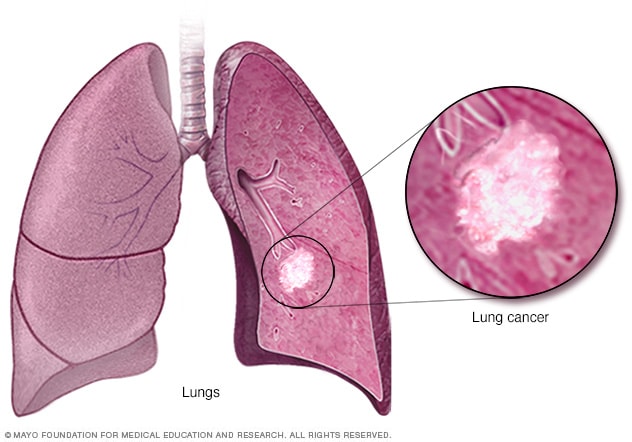Lung Cancer
Symptoms

- A new cough that doesn't go away
- Coughing up blood, even a small amount
- Shortness of breath
- Chest pain
- Hoarseness
- Losing weight without trying
- Bone pain
- Headache
Risk Factors
- Smoking
- Exposure to secondhand smoke
- Previous radiation therapy
- Exposure to radon gas
- Exposure to asbestos and other carcinogens
Screening People with an increased risk of lung cancer may consider yearly lung cancer screening using low-dose CT scans. Lung cancer screening is generally offered to people 50 and older who smoked heavily for many years. Screening also is offered to people who have quit smoking in the past 15 years.
Tests may include:
- Imaging tests
- Sputum Cytology
- Biopsy

Prevention
- Don’t smoke
- Avoid secondhand smoke
- Test your home for radon
- Avoid carcinogens at work
- Eat a diet full of fruits and vegetables
- Exercise most days of the week
Mayo Clinic
Lung cancer is a kind of cancer that starts as a growth of cells in the lungs. The lungs are two spongy organs in the chest that control breathing. Lung cancer is the leading cause of cancer deaths worldwide.
People who smoke have the greatest risk of lung cancer. The risk of lung cancer increases with the length of time and number of cigarettes smoked. Quitting smoking, even after smoking for many years, significantly lowers the chances of developing lung cancer. Lung cancer also can happen in people who have never smoked.

Click on the following links to learn more about the symptoms, risk factors, and treatment options for lung cancer:
American Cancer Society
Screening Guidelines: People who currently smoke or formerly smoked are at higher risk for lung cancer. The American Cancer Society recommends yearly lung cancer screening with a low-dose CT scan (LDCT) for some of these people.
To view more details about screening guidelines for prostate cancer please click on the following link:
National Cancer Institute
Advances in Lung Cancer Research: NCI-funded researchers are working to advance our understanding of how to prevent, detect, and treat lung cancer. The link below highlights some of the latest research in non-small cell lung cancer (NSCLC), the most common form of lung cancer.
Video Library
 Connect
Connect

 Connect
Connect